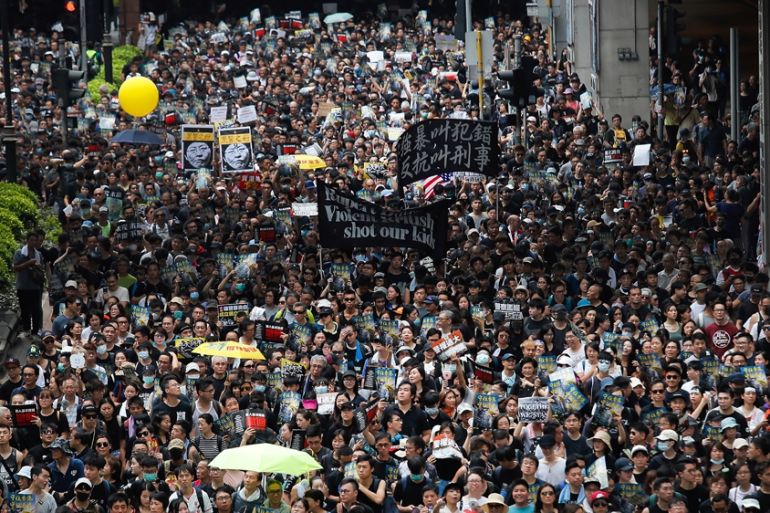Thousands back on Hong Kong streets to keep up pressure
Protests’ focus veers from extradition bill to broader issues increasing tension between HK people and mainland Chinese.

Tens of thousands of people have again rallied in Hong Kong, in their latest effort to grow their protest movement against what they see as mainland China‘s growing influence on the semiautonomous territory.
Demonstrators on Sunday marched in Sha Tin, a suburban area near the border that is popular with mainland Chinese shoppers, as the rallies move outwards from the heart of the financial centre into surrounding neighbourhoods.
Keep reading
list of 4 itemsHong Kong’s new security law comes into force amid human rights concerns
Hong Kong passes tough new national security law
What is Article 23, Hong Kong’s new draconian national security law?
Al Jazeera’s Jamela Alindogan, reporting from the march, said the large crowd of protesters included families “in droves”.
“[They are] speaking out against what they call creeping authoritarianism, threats to the way of life in Hong Kong.”
There were clashes between police and some protesters, with riot police using pepper spray and batons against small crowds who took over a road on the sidelines of the rally. Masked protesters responded by building barricades from metal fencing and a standoff with riot police ensued.
Most of the demonstrators dispersed shortly afterward as a small group sang the Christian hymn “Sing Hallelujah to the Lord”, which has emerged as the unlikely anthem of the protests.
Hong Kong has been hit by a wave of popular protests since early June following widespread anger over a controversial piece of legislation that would have allowed extraditions to the mainland. Although the Hong Kong government later suspended the bill, it has refused to officially retract it.
Opponents insist they will settle for nothing short of its formal withdrawal and have called for the resignation of Carrie Lam, the territory’s chief executive. Others have also staged protests over other grievances, including what they see as moves by the pro-Beijing government to erode Hong Kong’s freedoms and autonomy.
The youth-led protests have fuelled the former British colony’s biggest political crisis since China regained control of Hong Kong in 1997, and pose a direct challenge to authorities in Beijing.
|
|
Many protesters see the rallies as part of an existential fight against an increasingly assertive Beijing.
“This is a dangerous moment. Hong Kongers can choose to die or they can live. We’re on the edge but fortunately, we haven’t died off yet,” said JoJo So, a woman in her fifties who was attending the rally.
A few protesters waved British and United States flags, with banners calling for independence for Hong Kong flying from makeshift flagpoles. Some marchers beat drums and others carried banners that read, “Free Hong Kong.”
Chants of “Carrie Lam go to hell”, rang through the crowd, referring to the city’s embattled leader.
One placard featured a picture of Chinese leader Xi Jinping with the words: “Extradite to China, disappear forever.”
Broader issues
Earlier on Sunday, hundreds of journalists joined a silent march to demand better treatment from police at protests.
On Saturday, a largely peaceful demonstration against mainland Chinese traders in a town close to the Chinese border turned violent, as protesters hurled umbrellas and hardhats at police, who retaliated by swinging batons and firing pepper spray.
Alindogan said the protests have spread beyond the extradition bill as many people have been emboldened by the public support they are getting.
“John Lennon walls have sprung up in almost every single district of Hong Kong, with messages of support and messages of discontent,” Alindogan said.
“We’ve spoken to young people here who say they may have just been born in 1997… but they say they are the most disillusioned about the future of Hong Kong.
“They say they want protection of their way of life; the rule of life is being undermined; they want real political reforms which would ensure that their way of life isn’t threatened any more.”
Alindogan said that weeks into their movement, the protesters have found new ways to express their message “very strongly” and bring the demonstrations to suburban areas like Sha Tin.
“We are seeing very common slogans here, for example ‘Be water my friend’ – that’s actually a very popular line from a movie of legendary actor Bruce Lee, who also lived here,” she said.
“That is essentially the growing motto and slogan of the protesters, that they become malleable, that they adapt to the changing times – and we are seeing that.”
|
|
Hong Kong returned to Chinese rule 22 years ago under a “one country, two systems” formula that allows its people freedoms not enjoyed in mainland China, including the liberty to protest and an independent judiciary.
Beijing denies interfering in Hong Kong affairs, but many residents worry about what they see as an erosion of those freedoms and a relentless march towards mainland control.
The government condemned violent acts during Saturday’s protests against so-called “parallel traders” from the mainland who buy goods in bulk in Hong Kong to carry into China to sell for profit.
It said that during the last 18 months it had arrested 126 mainland visitors suspected of contravening the terms of their stay by engaging in parallel trading and barred about 5,000 mainland Chinese also suspected of involvement.